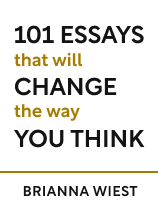

This article is an excerpt from the Shortform book guide to "101 Essays That Will Change the Way You Think" by Brianna Wiest. Shortform has the world's best summaries and analyses of books you should be reading.
Like this article? Sign up for a free trial here .
What is the number one cause of unhappiness? How does trying to make other people happy eat away at your own happiness?
One of the most common pitfalls that prevent people from being happy is, paradoxically enough, trying too hard to make others happy. Relying on positive feedback to feel happy creates a breeding ground for unwanted experiences and negative feelings. This is because seeking validation compels you to engage in two habits that disconnect you from your true needs: suppressing your feelings and pursuing the wrong goals.
Let’s explore how these two inauthentic habits eat away at your happiness.
Negative Habit #1: You Suppress Your Feelings
According to Wiest, your conditioning inadvertently taught you to believe that some feelings are unacceptable or bad. As a result, you feel ashamed each time these feelings come up, pretend that you don’t feel them, and try to avoid people and situations that might trigger them. You also judge other people who express these feelings as “bad” or “wrong.”
However, these suppressed feelings continue to live on inside you, get stronger the more you try to deny them, and morph into irrational thought patterns and emotional reactions that stifle your capacity to feel positive emotions.
Suppressed Feelings Lead to Irrational Thoughts and Emotions
You used to get punished for having tantrums as a child. Your tantrums were your way of expressing disagreement with something that you were expected to do. Therefore, you unconsciously associated expressing disagreement with punishment and labeled disagreement as “bad” or “wrong” in your mind.
Though unconscious, this mental association now shapes the way you think about and react to various situations and contributes to many of your unwanted feelings. This is because it leads to a number of unhealthy behaviors and thought patterns, such as:
You pretend to agree with others: Because you want to get along with others and receive positive feedback, you avoid disagreeing with them—either by pretending to take their side or staying quiet. However, the more you avoid expressing your true opinions, the more insecure you feel in your relationships—you never know if people like you for who you are or because you’re validating their opinions.
You agree to things that you don’t want to do: Even though this approach garners positive feedback, doing things you don’t want to do often makes you feel angry and resentful. However, because you’re unable to acknowledge how your own thought patterns created these unwanted situations, you mistakenly assume that other people are making you do things that you don’t want to do. This leads you to conclude that other people are to blame for your negative feelings. As a result, you don’t feel accountable for your role in these unwanted situations and you believe that you’re powerless to change them.
You judge people who do express their disagreement: Because you believe that expressing disagreement is “bad” or “wrong,” you automatically dislike or feel uncomfortable around people who do express their disagreement. Instead of questioning why you feel this way, you assume that your opinion is valid and that they should change the way they act to make you feel better.
Negative Habit #2: You Pursue the Wrong Goals
Wiest argues that your reliance on positive feedback compels you to focus more on how you’re perceived by others and less on how you really feel. She explains that your preoccupation with appealing to others is the number one cause of unhappiness because:
- It motivates many of your decisions and goals—meaning that you spend most of your energy doing things to please or impress others. For example, you wanted to be a nurse but your parents wanted you to become a neurosurgeon because it sounded more impressive to them. So, you dedicated years of extra training to become a neurosurgeon instead of pursuing your desired path.
- It prevents you from thinking about what your unique needs are and what you need to feel satisfied and happy—meaning that you spend a lot of energy doing things that don’t satisfy you or make you happy. For example, being a neurosurgeon leaves you joyless and unfulfilled, but you won’t quit because you fear losing the admiration you’ve worked so hard to attain.
Achieving Wrong Goals Makes You Feel Unfulfilled
Why would you make decisions and choose goals that waste your energy and make you unhappy? According to Wiest, it’s because you believe that happiness comes from having a life that appears perfect to others—and you make decisions and set goals to achieve your vision of this ideal life.
However, Wiest argues, your vision of an ideal life is simply a response to the way that you’ve been conditioned to please others. Unfortunately, conforming to what others want rarely satisfies your true emotional needs. Instead, it leaves you unhappy and unfulfilled and puts you in a never-ending cycle of “improving” and changing yourself to please those around you.
Further, because this conditioning is so deeply ingrained in you, you fail to question why your achievements aren’t making you happy. Instead, you assume that you just haven’t done enough to deserve happiness and that you need to be, do, or acquire something more—for example, by making yourself more attractive, acquiring more possessions, or achieving a higher status.

———End of Preview———
Like what you just read? Read the rest of the world's best book summary and analysis of Brianna Wiest's "101 Essays That Will Change the Way You Think" at Shortform .
Here's what you'll find in our full 101 Essays That Will Change the Way You Think summary :
- Why the only way to make yourself feel better is to change the way you think
- How social conditioning influences the way you unconsciously think
- How to manage your thoughts and feelings about yourself and your experiences






